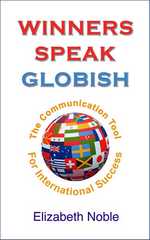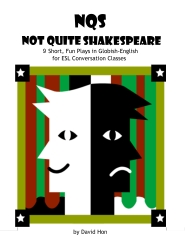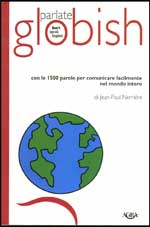Globish en El Païs
Vous trouverez ici un article paru dans El Païs, signé par le journaliste Francesco Manetto, en date du 30 mai 2010.
Cliquez ici pour lire l'article

Vous trouverez ici un article paru dans El Païs, signé par le journaliste Francesco Manetto, en date du 30 mai 2010.
Cliquez ici pour lire l'article
Mark Antony, according to William Shakespeare:
Friends, Romans, countrymen, lend me your ears;
I come to bury Caesar, not to praise him;
The evil that men do lives after them,
The good is oft interred with their bones,
So let it be with Caesar ... The noble Brutus
Hath told you Caesar was ambitious:
If it were so, it was a grievous fault,
And grievously hath Caesar answered it ...
Here, under leave of Brutus and the rest,
(For Brutus is an honourable man;
So are they all; all honourable men)
Come I to speak in Caesar's funeral ...
He was my friend, faithful and just to me:
But Brutus says he was ambitious;
And Brutus is an honourable man….
He hath brought many captives home to Rome,
Whose ransoms did the general coffers fill:
Did this in Caesar seem ambitious?
When that the poor have cried, Caesar hath wept:
Ambition should be made of sterner stuff:
Yet Brutus says he was ambitious;
And Brutus is an honourable man.
You all did see that on the Lupercal
I thrice presented him a kingly crown,
Which he did thrice refuse: was this ambition?
Yet Brutus says he was ambitious;
And, sure, he is an honourable man
. I speak not to disprove what Brutus spoke,
But here I am to speak what I do know.
You all did love him once, not without cause:
What cause withholds you then to mourn for him?
O judgement! thou art fled to brutish beasts,
And men have lost their reason…. Bear with me;
My heart is in the coffin there with Caesar,
And I must pause till it come back to me.
Next, below, is what Mark Antony might have said in Globish:
Friends, Romans, countrymen, lend me your ears;
I come to bury Caesar, not to praise him;
The evil that men do lives after them,
The good is often buried with their bones,
So let it be with Caesar ... The stately Brutus
Has told you Caesar wanted to be king:
If he said that, then it was a deadly mistake,
And it was deadly for Caesar today ...
I am allowed to speak here by Brutus and the rest,
(For Brutus is an honourable man;
So are they all; all honourable men)
I come to speak at Caesar's burial ...
Caesar was my friend, faithful and just to me:
But Brutus says Caesar wanted to be a king;
And Brutus is an honourable man….
Caesar has brought many prisoners home to Rome,
Whose fathers buy them back to our great profit:
Did this seem like Caesar was trying to take too much?
When the poor have cried, Caesar cries as well:
If he wanted to be king he should have had a stronger character:
Yet Brutus says Caesar was trying to be all powerful;
And Brutus is an honourable man.
You all saw that at the ceremony
I presented Caesar a kingly crown 3 times,
Which he did refuse 3 times: Did this man want to be king?
Yet Brutus says he wanted to rule us completely;
And, sure, he is an honourable man.
I speak not to argue with what Brutus spoke,
But here I am to speak what I do know.
You all did love Caesar once, not without cause:
What cause now keeps you from being sorry for him?
O wise thought! You have escaped to the animals,
And men have lost their reason…. Stay with me now;
My heart is in the ground there with Caesar,
And I must wait until it comes back to me.
Dear Philippe Dufresne,
It's a pleasure to answer you and I'm going to do it in globish.
The first point explaining the succes and the appeal of your method for me is to reduce the ambition in a first time. Then you propose for example to memorize 1500 words. It's possible for anyone. If you have to memorize 5000 words, you courage is immediately falling down. With this modest aim, you'll think you are able to do it and you'll try. And with this method you'll note soon that's actually easy .
At this step two helps are done: the sound, because of these series of sounds allow to drill the vocabulary many times, and this excellent explanation about use of sh'wa. With the sh'wa, learning vocabulary is easer and better, near the reality. You are suddenly learning the same words, the same sounds, which you can catch when you are watching the TV or hearing a conversation.
The second point is certainly, for me, the sentence building and the way to show in each "etape", for instance, the use of tense, with sentences you can repeat ten times or more, like a perfect model in your mind. I'd never understood and felt this important step for learning a language.
In fact and to conclude, I think the method is interesting with all its means got together, their addition and the real difference comparing several methods is maybe its particular spirit. Anyway, the method has been working very weel for me and I'm feeling like going on with it to improve my globish.
Congratulations on your work. Best regard.
Jean-Philippe Arm
Read the two documents below, in sequence as presented here, and then ask yourself the one and only key question: "if I wanted to help someone in Zanzibar or Oulan-Bator understand what is the idea behind globish, which of the two documents should I send?", ou, en français: "si je voulais aider un habitant de Zanzibar ou d'Oulan-Bator à comprendre l'idée du globish, lequel de ces deux documents lui ferais-je parvenir?"
American version (see below globish version in italic).
This little tidbit of literary joy is amiable and a slam dunk to peruse, notwithstanding the fact that it has the overwhelming gall to propose a revamping of our methods of verbal exchange around the world.
It is commonly believed that English, or American is now the lingua franca in the “global village”.
Less than twelve percent of mankind was born in an Anglophonic country and the others are hung up in a major way when speaking to Anglophones.
They are bummed out about potentially falling on their faces in normal intercourse; they are just not getting it; and they don’t feel they are on the proper wave length.
It can make them feel embarrassed.
But, when they shoot the breeze with non Anglophones, the wicket isn’t sticky any more..
As everybody makes mistakes, there is less fear of malaprops. Observationally speaking, it’s a breeze to share ideas with Italians, Japanese, Argentineans or Ukrainians, more so than with Anglophones.
Jean-Paul Nerrière lays out that theory, and everyone can play with it as they wing and hop around the world. Mankind always needed a common language to exchange and share ideas.
Today, it is a subset of English, with a grammar that doesn’t bust your chops, no trouble with accents, and a small set of useful words (1 500).
This language is different enough from stringent English, and more constrained to the point that it must given a different moniker - Globish. English is spoken in England, and Globish is spoken in the “global village”, everywhere by everyone. They can be called Globiphones.
With it, the non Anglophones are way ahead of their English or American counterparts. Their command of Globish, spoken as well as written or heard, is much more on the mark. 95% of the time, native Anglophones speak English with loved ones and mates hence their ear is not used to all the strange verbal and auditory distortions when others are speaking English that they may find
around the world.
Native English speakers can’t quite hack it when they need to dumb down to the 1 500 key words. The language they have to speak or write is expected to be kosher, if not perfect.
As a simple globiphone, you are satisfied as soon as someone connects with you and digs what you’re saying.
Globiphones are at least seven times more populous than Anglophones speakers . The proof is in the pudding that a new language has appeared.
Although Globish looks and sounds akin to English, there is the same difference as between wine and booze: a still extracts the latter from the former, and it is limited but much more potent.
The purpose of this book is to lay this tool out for you. It also gives a method for picking it up in a snap, and gives you the manual on it.
The target is always to get to lay it on the line. In most cases, it is much better to tweak the speech a little, than to try to utter the Queen’s English.
The real target here is also to decipher what’s coming across at you . If you don’t, you should not let your friend from California throw one past you; lay it on him, “Hey Bro, this time in Globish please?”
As far as communication is concerned, the burden of proof is on the one who speaks. If and when needed, it is up to him to crank it down to the channel of the one that is listening, or reading.
With the imminent growth of Globish, the leverage of the Queen’s English is going to go downhill. This is a real break for all the other languages. They will be again on a par with English, each carrying its own cultural wealth. Globish will be the tool for commercial intercourse ,daily what-nots and getting around activities.
The book is chocked full of examples, it’s a blast, dealing with the real stuff, and full of useful tid bits. But, it is also serious and deals with a completely new idea that will apply everywhere in the world, especially in Anglophonic countries.
Globish version.
This book is easy to read and with pleasure. Still, it proposes a complete change in the way we communicate around the world.
It is commonly believed that English, or American is now the official language in the “global village”.
However, 88% of mankind (humans) was not born in an English-speaking country. Those persons usually do not feel comfortable when they need to discuss with native English speakers.
They are concerned about making mistakes, understanding with great difficulties, and being understood.
They can feel put down.
But when they discuss with non native English speakers, things are much better.
As everybody makes mistakes, nobody feels bad. Everyone observes that it is much easier to share ideas with Italians, Japanese, Argentineans or Ukrainians than with native English speakers.
Jean-Paul Nerrière builds and demonstrates that theory, and everyone has a chance to experiment with it as soon as he or she travels a lot around the world. Mankind always needed a common language to exchange and share ideas.
Today, it is a certain form of English, with a sentence building that is not too demanding, no trouble with accents, and a small set of useful words (1 500).
This language is so different from formal English, and more limited that it must given a different name – Globish. English is spoken in England, and Globish is spoken in the “global village”, everywhere by everyone. They can be called Globiphones.
With it, the non native English speakers are much better off than their English or American friends. Their command of Globish, spoken as well as written or heard, is much more effective. 95% of the time, native English speakers speak English with their family or their countrymen and their ear is not used to all the strange accents you find around the world.
Native English speakers have great difficulties when they want to reduce their words down to the 1 500 key ones. On top of that, the language they have to speak or write is expected to be correct, if not perfect.
As a simple globiphone, you are satisfied as soon as it is just understandable.
Globiphones are at least seven times more numerous than Native English speakers . We should accept the evidence that a new language has appeared.
Although Globish looks and sounds similar to English, there is the same difference as between Wine and Cognac: one comes from the other, and is limited but much more powerful.
The purpose of this book is to define and describe this tool. It also gives a method for learning it easily, and explains how to use it.
The target is always to get the message across. In most cases, it is much better to speak with some simple tricks, than to try to speak a better English.
The goal is also to make sure you understand what is said to you. If you don’t, you should make it a duty to tell your friend from California, “could you repeat that, in Globish this time, please?”
The responsibility for communication belongs to the one who speaks. If and when needed, it is up to him to step down to the level of the one that is listening, or reading.
With the current and increasing spread of Globish, the power of English is going to decrease. This is excellent for all the other languages: they will be again equal with English, each carrying its own cultural wealth. Globish will be saved for business and day to day problems.
The book is loaded with examples, it is fun, realistic, full of useful advice. But it is also serious and deals with a completely new idea that will work everywhere in the world, especially in English speaking countries.
"Monolingual Britain", an article about the current English positionning today in the worldwide arena, and about the emerging Globish concept, by Helen Joyce. December the 13th issue of "the Economist".
Can be found on http://www.economist.com/world/britain/displaystory.cfm?story_id=8418152
An ebook by Elisabeth Noble
Une Anglophone de naissance consacre un livre au "Globish", facile à lire, bien documenté, plein d'anecdotes et d'observations inédites.
A commander sur www.smashwords.com

A native English speaker wrote a book about "Globish". It is full of anecdotes, easy to read even for non Native English speakers, and it gives a fair and balanced representation of the Globish concept.
Order at www.smashwords.com
 31,4%
fr-FR
31,4%
fr-FR
 18,2%
United States
18,2%
United States
 6,1%
Canada
6,1%
Canada
 5,8%
Germany
5,8%
Germany
 5,3%
Singapore
5,3%
Singapore
Total: 123 Pays |
2829646
|
|
Globish IN Globish est un cours en auto-apprentissage facile à utiliser tout autant sur un ordinateur que sur n’importe quel téléphone portable muni d’une connexion à Internet. Pour l’utiliser, il vous faut être capable de lire et comprendre les 35 mots les plus communs en anglais, et donc repris en globish (les tests ont montré que ceux qui avaient quitté l’école le plus tôt possible maîtrisaient 850 mots d’anglais, ne serait-ce que parce que nous les utilisons dans le quotidien du français). Dès que vous pensez en dominer plus que 350, vous pouvez débuter au niveau que choisirez, en rapport avec votre capacité.
Les deux premières leçons vous sont offertes gratuitement sur tout ordinateur muni d’un accès à internet.
En travaillant exclusivement en globish, vous pouvez rapidement apprendre la grammaire, et des mots nouveaux, avec leur prononciation, dans le cadre d’une histoire contextuelle. L’apprenant qui arrive au terme de Globish IN Globish devrait se trouver parfaitement à l’aise du niveaux B1-B2 attribués par le « Common European Framework of Reference for Languages » (CEFR).

Globish IN Globish is an extensive self-study course in Globish that is easy to use on either any standard computer with Internet capability. To use it you must be able to read the most-common 350 words in Globish/English. Then you can begin at any point that matches your ability. Try the first two lessons now, for free, on either your mobile phone or on a computer that has Internet.
By working only in Globish, you can quickly learn both grammar, and new words with pronunciation, in a story context. The student who completes Globish IN Globish should be quite capable at B1-B2 (English) levels given by the Common European Framework of Reference for Languages (CEFR).
Not quite Shakespeare (« pas tout à fait du Shakespeare ») est une collection de 9 courtes pièces de théâtre, rédigées entièrement en Globish, avec le vocabulaire original des 1500 mots recommandés. Elle est destinée aux enseignants qui souhaitent mobiliser des classes sur la conversation. NQS donne aux étudiants des rôles à jouer, et les amène dans des domaines d’expression dépassant largement « je vais chez le boulanger acheter le pain ». Ces documents fonctionnent très bien pour la prononciation, d’autant plus que l’apprenant est ici traité comme un acteur, et non plus que comme un étudiant.
Cliquez ici pour une démonstration gratuite, Auditions for God, sous forme de publication électronique dont vous est laissée toute liberté d’usage. « Auditions For God » se joue avec quatre personnages, et ne nécessite rien de plus qu’un pièce pour lire et jouer la pièce. Comme il convenait dans les pratiques du Moyen-Âge, le rôle de Dieu est le mieux rémunéré, et de nombreux acteurs se présentent en audition pour le rôle. Finalement Dieu se porte candidat en personne (et n’est pas vraiment très bon..)

Not Quite Shakespeare is a collection of 9 short, proven plays in 1500 Globish words, for teachers who want to involve their large English-Conversation classes. NQS gives students proven real plays whose subject matter goes far beyond the usual role plays like "going to the store and buying bread". It also works very well for pronunciation tutoring, as the student is treated as an actor with a performance to give, rather than as a student.
Click here to try a free play, Auditions for God, in e-book form, which you may copy and use as you wish. “Auditions For God” is for four characters and needs nothing but a room to read or perform. Based on actual medieval practices, the role of God receives the highest pay, so many actors come to audition for the role. Finally, God himself auditions. (He's not very good.)
Vous trouverez ci joint la transcription en Globish du discours d'investiture du Président Barak Obama.
Cette transcription est faite en parallèle du texte originel
Bonne lecture

You will find here the speech given by President Obama for his inauguration January 20th, and also its transcription in Globish. The latter would be readily understood by a much larger number of non Anglophone like foreign citizens and immigrants. We hope you enjoy the reading.

 Les deux éditions
Les deux éditions
parues en Corée Parution en Italie
Parution en Italie Parution en Espagne
Parution en Espagne
 Les deux éditions
Les deux éditions
parues en chine.